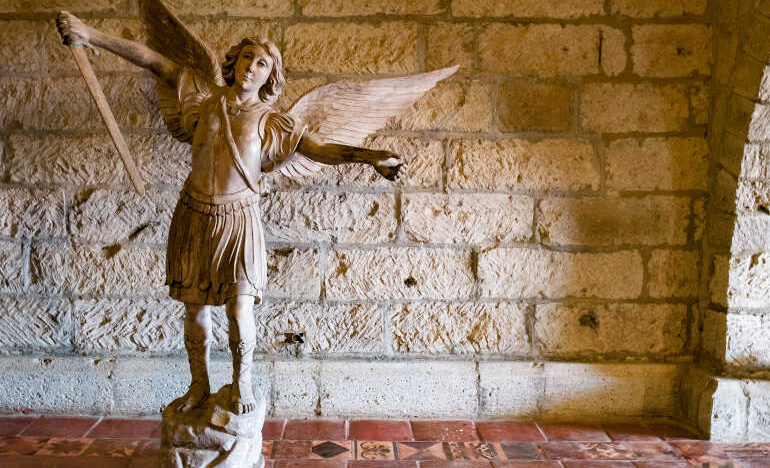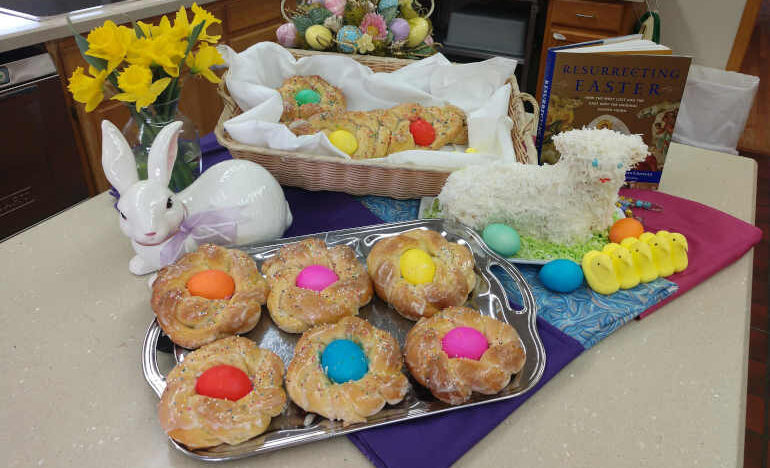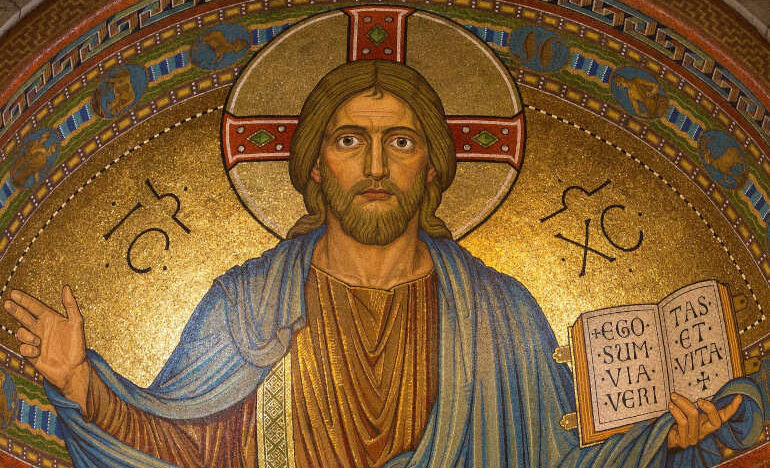Fighting Evil vs. Doing Good

An Assembling God’s Puzzle video
By Fr. Garry Richmeier
We all know how the story goes. All is well until the bad guy/gal shows up and perpetrates evil somehow. Then the good guy/gal steps up in an attempt to thwart the evil plans and get rid of the bad person. A battle follows in which the outcome is uncertain. But in the end, good triumphs over evil, the bad guy/gal is eliminated, imprisoned, or otherwise made powerless, and all is well again. This plot seems to be ingrained in our psyches as the way things have to work. Most of our movies and novels follow this plot. And when we tell stories of where we or our ancestors came from, we often tell them using this kind of storyline. History is written using this image. History is written by the victors, as they say, and the victors usually portray their historical role as fighting evil and preserving the good. Many religions are based on this good vs. evil dynamic where God (and God’s people) battle the devil (and the devil’s people) in a never-ending war.
This view of how things work is a piece of life’s puzzle for us, and we come by it honestly. We keep trying to fit it into our lives and make it work somehow, but it rarely seems to get us where we want to go. When we “fight evil” by telling someone what they are doing wrong, they often dig in their heels, keep doing what they’re doing, and quit listening to us. When one party of Congress attacks the other party for doing what it disagrees with and considers “evil,” political war ensues and nothing gets done. When one religion denounces another religion because it professes something different (bad, evil), holy wars often follow.
The medical world usually follows this model also. Modern medicine’s goal is to find and fight the “evil” (the cancer, the infection, the artery blockage). This isn’t bad, but most of society’s effort and money goes toward this end, and relatively little attention is paid to promoting other healthful things that could prevent the diseases in the first place. So we end up in a never-ending war with physical ailments that keep coming back.
There is something about fighting evil that sounds noble, that feels right, that makes sense. But it really causes us problems if that is all we do. One reason is because we never win the war against evil. We can stamp it out in one spot, but it pops up in another. We kill the one bad guy/gal, and another one steps up to take their place. We wage war against those who are evil, and the collateral damage makes life miserable for us. The antidotes we apply to fighting evil usually bring their own terrible side effects. No one can win this war, but we feel there is no other alternative. So we doom ourselves to the endless, hopeless battle.
There is an alternative to this war, but it is rather counterintuitive, and involves adjusting our view of how things work. Instead of putting all our effort into fighting evil, we could put more of our efforts into doing good. The difference may be a bit subtle, but it is an important distinction. It is the difference between using our power to get rid of something (evil) and using our power to create something (good). It involves trusting that doing the “good” will be more effective in accomplishing our goals. But it is often a leap of faith.
In counseling I try to help people make this shift. For example, a married couple comes in because they often fight, telling each other how the other is wrong (fighting evil). It makes their life miserable. I suggest putting their efforts instead into doing something good, like listening a little more and making efforts to understand the opposing view. This often has better results.
Another example on a national level: Some people see the influx of immigrants and refugees on our southern border as an evil to be fought. We spend many tax dollars on border patrol, apprehending offenders, incarcerating people, transporting people elsewhere, etc. This seems to be a never-ending “battle,” costing lives, resources, and peace of mind for many. Instead of battling, we could choose to do good instead. One possibility would be to help the countries of immigrants and refugees provide what people need to live so they wouldn’t need to look for those necessities across the border. We could identify many other ways to accomplish something good in this regard if we weren’t focused only on fighting evil.
Doing good rather than fighting evil takes faith and trust that the good will prevail. When we fight evil, we feel we are in control, calling the shots. When we do good rather than fight evil, we have to let go of our direct control and let the good do the work. This is difficult because we often don’t see immediate results from the good that we do. And it often takes time for the good that we do (like listening, being compassionate, charitable, forgiving, etc.) to have an effect on others around us. But that is the point of the Paschal Mystery for those of us who are Christian, that new life is the result of practicing love, even when it involves sacrifice.
Jesus didn’t battle evil much. He didn’t try to destroy Satan when Satan tempted him in the desert. He didn’t kick out the sinners from his group of followers. He didn’t get rid of Judas when he knew Judas would betray him. He didn’t call down lightning bolts to zap Caiphas the high priest or Pontius Pilate and the Roman soldiers who crucified him. Instead of fighting evil, he simply did good, which was love. And that was enough.
We humans don’t give up our battles easily. And I know there is no way to convince anyone to do that. But if we know there is an alternative to fighting evil all the time, and wearing ourselves out in the process, we might be up for giving it a try a little more often.
All of the videos in this series can be found here: Assembly God’s Puzzle.
Never miss an article published on the Renewal Center website: Sign up to receive our newsletters.
[Fr. Garry Richmeier, a Precious Blood priest and spiritual director, holds a Master’s of Divinity Degree from St John’s University in Collegeville, Minnesota, and a Master’s of Counseling Psychology degree from the University of Missouri-Kansas City. He is a licensed professional counselor and a licensed marriage and family therapist.]
We’d Like to Hear from You!
We’d like to know what you think about this article. Send us a comment using the form below. Do you have a suggestion? Is there something you want to learn more about? Send us a note.
Related

Easter Bread (Pane di Pasqua)
By Lucia Ferrara
Easter bread is a fun bread. It’s a fun bread to make with your children, with your family, with neighbors and friends. The tradition of Easter bread dates back centuries and comes from many parts of the world.

Easter Sunday, the Resurrection of the Lord
Today’s scriptures tell us how three days changed the world. How have they changed you?
Categories
Assembling God's Puzzle Coffee with Padre Cooking & Spirituality Encounters of the 4th Kind Family Matters Reflections on the Eucharsitic Prayers Spiritual Resources Taize Prayers The Contemplative Life Traveling with Pilgrims of Hope Uncategorized Videos Week of Prayer for Uhristian Unity When you need a little help
